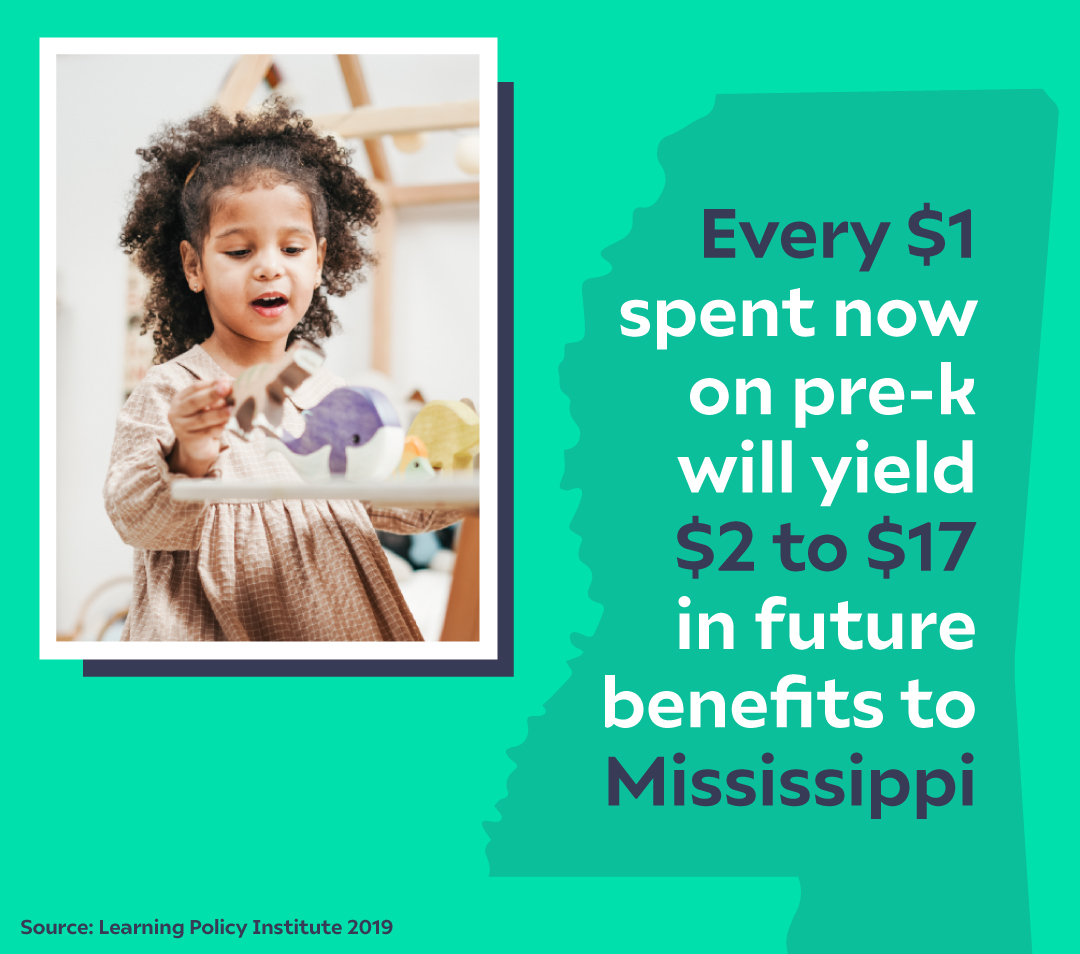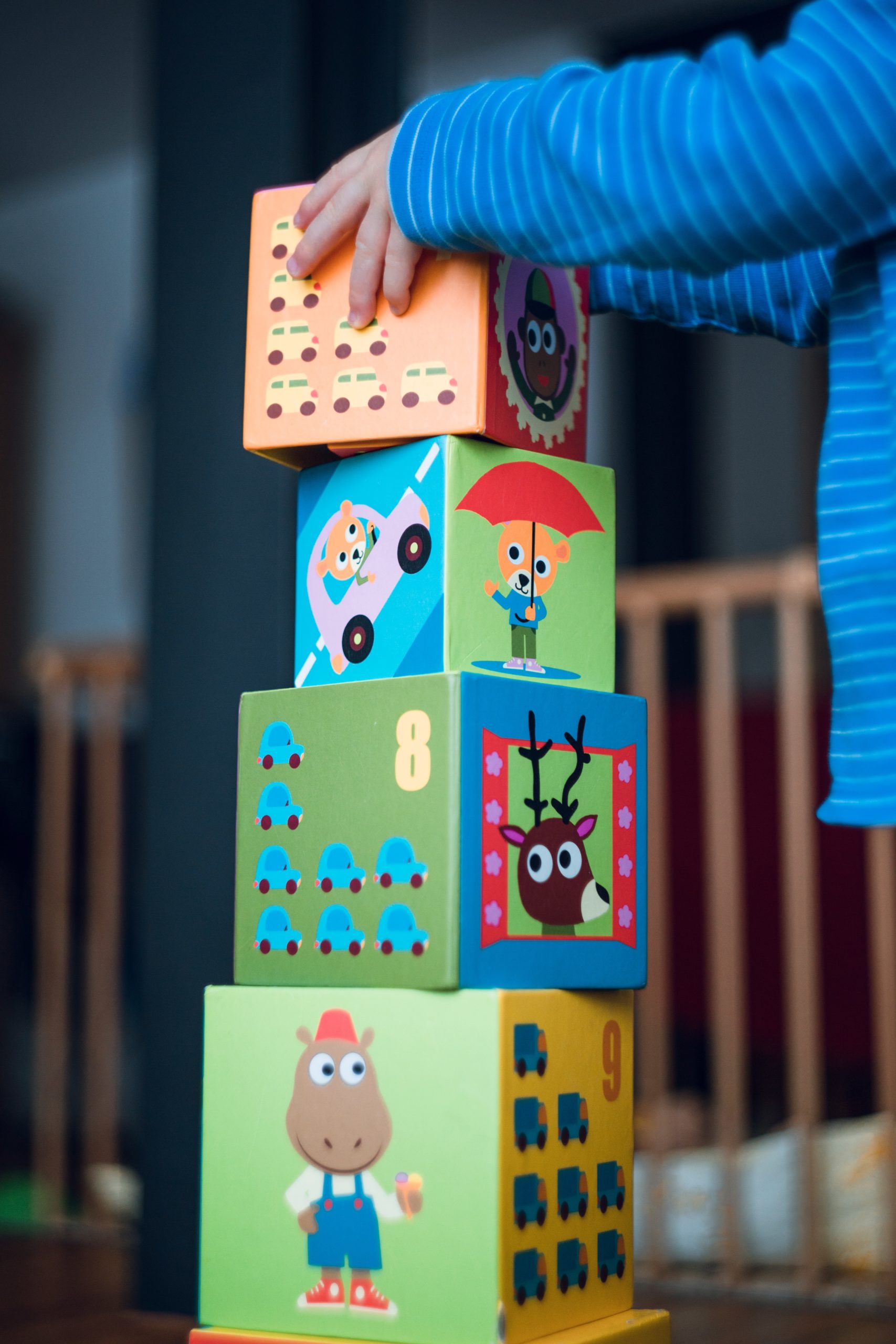Early Childhood
High Quality Preschool Yields Lifelong Benefits
Mississippi faces a critical problem with children who arrive in kindergarten without the basic skills necessary for learning to take place. Many children arrive with no concept of a letter, a number or a shape; they do not understand that text conveys meaning. Some have no idea even how to hold a book.
Preschool, especially high quality pre-k, has been shown to produce clear benefits in participating students’ early literacy skills and in closing learning gaps between children who reside in low-income households and those from more affluent households.
The Mississippi College- and Career-Readiness Standards call for reading fluency by the end of the kindergarten year. High quality early childhood education can help children develop the pre-literacy skills they will need to read fluently by the end of kindergarten.

Research has shown that when children are provided high quality early childhood experiences they are
- less likely to become teen parents
- more likely to be employed
- less likely to use public assistance programs
- more likely to attend and complete college
Sources:
Evidence on Preschool Preparedness, Learning Policy Institute, 2019
Early Childhood Facts, Southern Education Foundation, 2018
State-funded Pre-k in Mississippi


Background: in 2013, the Mississippi Legislature for the first time dedicated state funding to pre-kindergarten programs through the Early Learning Collaborative Act. Under this act, state funds are provided to local communities to establish, expand, support, and facilitate the implementation of high quality early childhood education through collaborations between school districts and public and private childcare centers.
State funding was recommended to be $8-million annually for three to five years, increasing to $16-million annually in the second phase and $34-million annually in the final phase. For the first three years of the program, the Legislature appropriated $3-million annually and moved to $4-million annually for two succeeding years. Funding reached $6.5-million for 2018-2019, $6.7-million for 2019-2020, and $7.8-million for 2020-2021. For 2021-2022, funding for collaboratives doubled to $16-million and $1.5-million was appropriated for early learning coaches.
The appropriation for ELCs grew again in the 2022 Legislative Session, with $8-million in new funding. A total of $24-million was allocated to Early Learning Collaboratives for 2022-2023 and again for 2023-2024, at a per-student rate of $2,500 (for full-day programs) and $1,250 (for half-day programs). State funding for collaboratives grew again in the 2024 Legislative Session, with $32-million appropriated for 2024-2025.
As of August 2024, 40 Early Learning Collaboratives are operating across Mississippi, serving 6,800 children (approximately 18% of Mississippi’s four-year-olds).
New funding of $20-million was appropriated in the 2022 Legislative Session for public school pre-k programs that are not part of collaboratives. That same level of funding was repeated in the 2023 and 2024 sessions. As of August 2024, 24 public school pre-k programs (known as State Invested Pre-K or SIP) are receiving these state funds.
An additional $3.2-million is allocated for early learning coaches, bringing total state funds supporting early learning to $55.5-million for 2024-2025.
See map of all state-funded pre-k locations. (Source: Mississippi Department of Education, August 2024)
Mississippi: 1 of 5 States Meeting All National Benchmarks for Early Education Quality
Mississippi is one of only five states that meets all 10 of the benchmarks set by the National Institute for Early Education Research (NIEER) for minimum quality standards in state-funded pre-k programs.
Source:
State of Preschool 2021 – National Institute for Early Education Research


Investing in Early Childhood Education
For every dollar spent on participants in the Chicago Child Parent Centers, researchers claim that $10 is returned by age 25 either in benefits to society – such as savings on remediation in school and on the criminal-justice system – or directly to the participant, in the form of higher earnings. The Chicago Child Parent Centers, started in 1985, were created in the public schools of Chicago for low-income African American and Hispanic families with children from ages 3- to 9-years-old. Source: Education Week


Economists and business groups across the nation have documented the importance of early childhood education as an investment in economic development. For example, the Business Roundtable (representing America’s top 500 corporations), the Committee for Economic Development (a 60-year-old national business group), and the Federal Reserve Bank of Minneapolis have issued reports demonstrating that high-quality pre-k programs provide the best long-term investment for economic growth. In their words, the economic return “on investment from early childhood development is extraordinary.” Pre-k offers “greater potential returns and substantially less risk” than state subsidies and incentives that try to attract plant locations, company headquarters, office towers, entertainment centers or professional sports stadiums and arenas.
The Learning Policy Institute provides a clear conclusion: “Preschool pays for itself.” With economic returns on investment ranging from $2 per $1 invested to $17 per $1 invested, “no cost-benefit analysis of a preschool program has ever found zero return, and any return that exceeds $1 for every $1 spent means the program more than pays for itself.”

